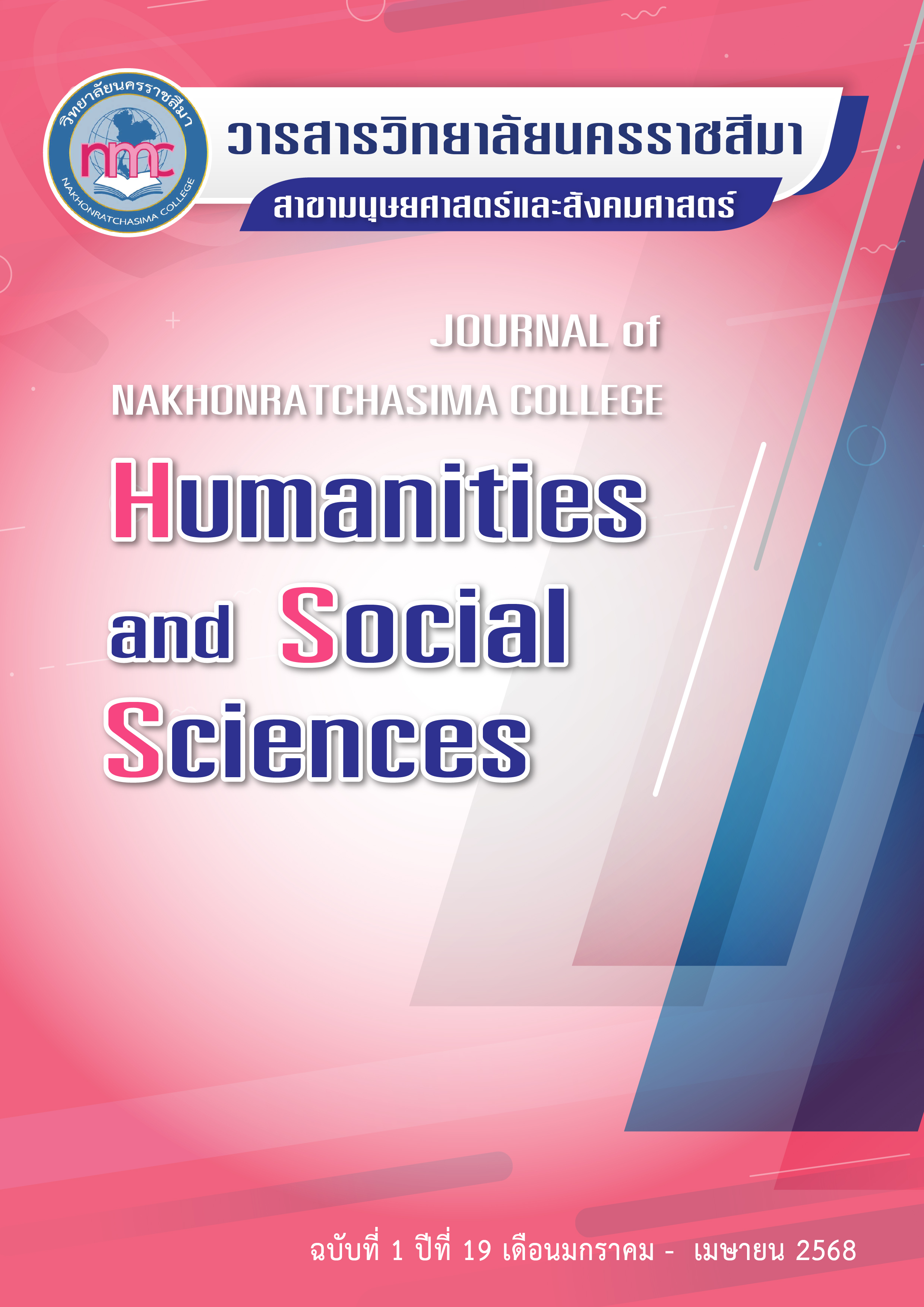Development of Learning Achievement and Satisfaction on English Speaking of Chinese Second-Year College Students of Guangxi Polytechnique of STAD Cooperative Learning Technique
คำสำคัญ:
STAD Techniques, Learning Achievement, Satisfactionบทคัดย่อ
The purposes of this study were (1) to compare learning achievement on English speaking between pre-test and post-test (2) to compare learning achievement on English speaking with the 75% criteria (3) to study students’ satisfaction on English speaking using STAD The samples were the 2nd-year English majors students Guangxi Polytechnic of Construction, the second semester of the academic year 2023, which are 23 students who were conducted by simple random sampling. The research design was one group pre-test post-test design. The research instruments are 1) learning management plan, which has the means of quality at the average of 4.90 2) achievement test which has the reliability at 0.80 3) satisfaction evaluation form, which has the IOC value between 0.60-1.00 4) the data was collected by using mean ( ), standard deviation (S.D.), percentage and t-test
The research findings were as follow:
- The post-test score was higher than the pre-test score at 0.01 level
- The post-test score was significantly higher than the 75% standard at 0.01 level.
- The Students are satisfied with learning English speaking using STAD at the highest level. (
= 4.82)
เอกสารอ้างอิง
Slagle (2009). students in secondary social studies who participated in cooperative learning utilising STAD.
Bolton, Kingsley and David Graddol. (2012) “English in China Today: The Current Popularity of English in China is Unprecedented, and Has Been Fuelled by the Recent Political and Social Development of Chinese Society.”English Today. vol. 28, no. 3:3-9. doi: 10.1017/S026607841200022 Bunchom Srisa-at. 2017). Basic research. Bangkok: Suviriyasan.
Chamaiporn Rangsiyanupong. (2015). Development of learning achievement and group work behavior.and attitudes towards learning mathematics on probability of students in Mathayomsuksa 5 /3 at Amphawan Wittayalai School by using a group teaching method of STAD achievement. Thesis in Mathematics Studies. Silpakorn University
Chamaiporn Rangsiyanupong. (2016) The development of learning attitudes toward English.
Kamonchanok Senkaew's research. (2017), which was consistent with
Hu, Guangwei. (2005) “English Language Education in China: Policies, Progress, and Problems.”Language Policy, vol. 4, no.1: 5-24. doi: 10.1007/s10993-004-6561-7.
Hu, Ran and Bob Adamson. (2012) “Social Ideologies and the English Curriculum in China: A Historical Overview.” In Perspectives on Teaching and Learning English Literacy in China, edited by Jiening Ruan and Cynthia Leung, 1-17. doi: 10.1007/978-94-007-4994-8_1.
Slagle, D. R. (2009). The Use of Cooperative Learning Strategy STAD to Promote Academic Achievement in a High School Social Studies Class. Submitted to the Master of Arts in Education Programme of Defiance College in Partial
Widhyastika, D. P., Sutarsyah, C., & Suparman, U. (2017). Developing Student-Team Achievement Division (STAD) Technique to Encourage Student Reading omprehension Achievement Based on Extrovert and Introvert Personality. Journal of Creative Education, Vol.10 No.12, November 29, 2019.
Wyk, M. M. V. (2012). The Effect of the STAD-Cooperative Learning Method on Student Achievement, Attitude and Motivation in Economics Education. Journal of Social Science, 33, 261-270. https://doi.org/10.1080/09718923.2012.11893104
Wyk (2015). STAD helped tenth graders learn more about current economic issues.
Yule, G. (2000). The study of language. 1sted.Beijing: Foreign language teaching and research press.
Kamonchanok Senkaew. (2018). "A study of the academic achievement in mathematics using the STAD collaborative learning technique of Mathayom 1 students." Master of Education Thesis, Department of Mathematics, Faculty of Education, Kamphaeng Phet Rajabhat University.
ดาวน์โหลด
เผยแพร่แล้ว
รูปแบบการอ้างอิง
ฉบับ
ประเภทบทความ
สัญญาอนุญาต
จรรยาบรรณผู้เขียนบทความ
ผู้เขียนบทความต้องรับรองว่าบทความนี้ไม่เคยตีพิมพ์ในวารสารใดหรือสิ่งพิมพ์อื่นๆ มาก่อน ต้องไม่คัดลอกผลงานผู้อื่นมาปรับแต่งเป็นบทความของตน และไม่ได้อยู่ระหว่างการเสนอเพื่อพิจารณาตีพิมพ์ อีกทั้งยอมรับหลักเกณฑ์การพิจารณาและการตรวจแก้ไขบทความต้นฉบับโดยกองบรรณาธิการวารสารวิทยาลัยนครราชสีมา สาขามนุษยศาสตร์และสังคมศาสตร์
บทความทุกเรื่องได้รับการตรวจพิจารณาทางวิชาการโดยผู้ทรงคุณวุฒิที่มีประสบการณ์และมีความเชี่ยวชาญตรงตามสาขาของบทความ ซึ่งผู้เขียนต้องแก้ไขตามคำแนะนำของผู้ทรงคุณวุฒิภายในระยะเวลาที่กำหนด หากไม่เป็นไปตามกำหนดกองบรรณาธิการขอสงวนสิทธิ์และยกเลิกการตีพิมพ์โดยจะแจ้งให้ทราบต่อไป
ข้อความที่ปรากฏในบทความของวารสารนี้เป็นความคิดเห็นของผู้เขียนซึ่งไม่เกี่ยวข้องกับวิทยาลัยนครราชสีมาแต่อย่างใด และกองบรรณาธิการขอสงวนสิทธิ์ในการพิจารณาและตรวจประเมินบทความเพื่อตีพิมพ์ในวารสารของวิทยาลัยนครราชสีมา สาขามนุษยศาสตร์และสังคมศาสตร์



